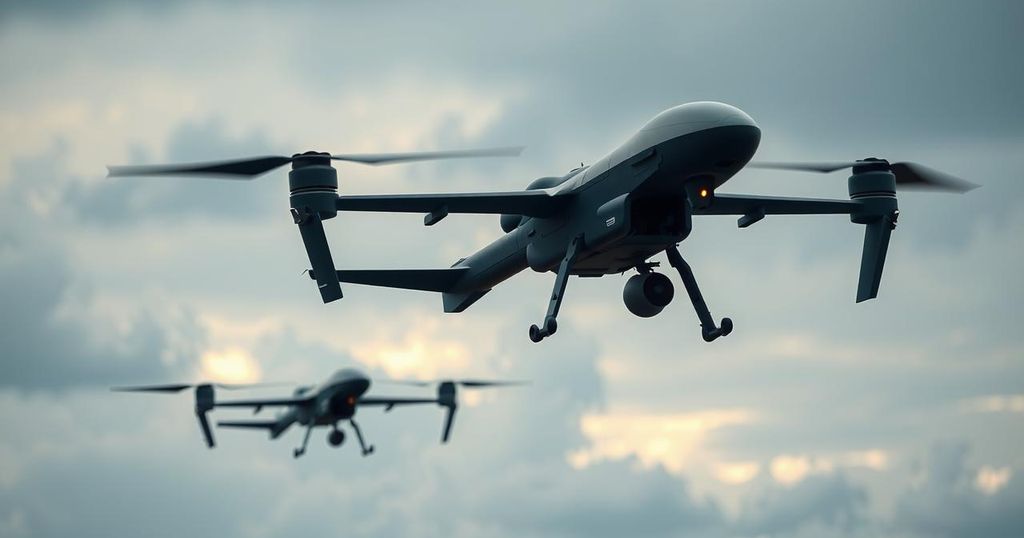A Kurdish military official denied that Kurdish forces acquired drones from Iran, attributing such claims to Turkish propaganda. He emphasized that their drone capabilities are home-grown and basic. The official criticized Turkish media for distorting the Kurds’ image and discussed the tense political landscape in Syria, expressing concerns about the implications for Kurdish autonomy and safety amid ongoing Turkish military actions and regional instability.
A Kurdish military official asserted in a video call with The Jerusalem Post that Kurdish forces have not obtained drones from Iran, dismissing such claims as Turkish propaganda. This statement followed an article from the Turkish media outlet Yeni Safak, which accused the Kurds of acquiring drone technology from Iran. The official stressed that their drone capabilities are entirely developed in-house and are basic compared to those claimed by their adversaries.
The official criticized Yeni Safak for its loyalty to Turkish President Erdogan, suggesting that the outlet is attempting to tarnish the Kurds’ reputation by linking them with extremist groups. This strategy, he claims, is a response to the failure of Turkish forces to suppress Kurdish fighters on the ground. He highlighted the Kurds’ control of 30-35% of Syrian territory, emphasizing that their autonomy poses a challenge to Erdogan’s objectives.
The Kurdish-led Syrian Democratic Forces (SDF) subsequently rebuffed the claims made by the Turkish media, stating that their drone capabilities are a result of local efforts and dismissing the accusations as blatant fabrications designed to harm their forces and create animosity towards the Kurdish cause.
Historically, there has been deep-seated animosity between Turkey and the Kurdish minority, which constitutes a significant percentage of Turkey’s population. The Turkish government attributes the Kurdish population’s struggles to a link with the PKK, which has led to military actions in Kurdish regions of Syria and significant occupation since 2016.
The Kurdish official expressed concern about the ramifications of the current power dynamics in Syria as Turkey stands to gain influence. He asserted that both Turkey and Iran share a disdain for Kurds and warned that any new governmental structure may not foster equality for the Kurdish population.
When queried about the prospects for Kurdish relations with the new regime in Syria, the official responded with skepticism, noting the precarious state of the political landscape and highlighting growing extremist activities within the region. He linked these developments to the potential resurgence of groups like ISIS, which poses a serious threat to minority communities.
In discussing Israel, the official acknowledged the historical significance of the Jewish people and expressed respect for Israel’s potential role in promoting regional stability. He stated that while cooperation is hindered by current political challenges, he believes Israel’s strong capabilities could be instrumental in combating terrorism and fostering peace.
The Kurdish military official’s statement reflects ongoing tensions between Kurdish forces and the Turkish government, exacerbated by media narratives that blur the lines between fact and propaganda. The historical context of conflict between the Kurds and the Turkish state is rooted in ethnic tensions regarding autonomy and national identity, particularly reflecting on the ongoing Syrian Civil War and its implications for regional power balances. This backdrop influences the Kurdish perspective on their autonomy, their capabilities, and their relations with neighboring powers like Turkey and Iran. Furthermore, the official’s comments on Israel indicate a nuanced understanding of regional dynamics and the potential for alliances based on shared interests in stability and peace.
In conclusion, the Kurdish official’s emphatic denial of drone acquisitions from Iran and critique of Turkish media illustrates the complexities of regional politics and the media’s role in shaping public perception. The entrenched rivalry between Kurds and Turkey, combined with instability in Syria, poses challenges for Kurdish autonomy and safety. Additionally, the Kurdish perspective on Israel suggests potential for future collaboration under favorable circumstances. The statement captures both the historical context and current dynamics of the Kurdish struggle for recognition and safety.
Original Source: www.jpost.com






